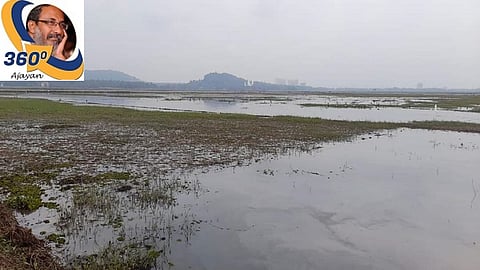

#Ajayan
Sheer callousness of the authorities can exact a heavy toll on the koleland (wetland) paddy farmers in Thrissur district. The entire paddy cultivation, spanning across 136.4 sqkm in the districts of Thrissur and Malappuram, has been significantly delayed, stretching over nearly two months.
Farmers assert that the delay is attributable to the authorities' neglect in promptly clearing the water pathways of moss, weeds and swamp, impeding the essential drainage process crucial for commencing farming activities. These operations commence by late September, allowing for timely sowing. By December, the plants should have achieved a substantial size under normal circumstances, KK Kochumohammed, president of the Kole Karshaka Sangham, told Metro Vaartha.
The responsibility for initiating the clearing operations lies with the Kerala Land Development Corporation, a government entity that funds these crucial activities. However, farmers assert that this time, the initiation of the work was delayed, purportedly due to a lack of funds. Consequently, the entire process has been significantly hindered, exacerbating the challenges they face. This comes when incidents of farmer suicides and delays in paying for the paddy collected from farmers have been haunting the State.
Sowing operations have commenced, and the subsequent harvest is expected after approximately 130-140 days. Traditionally, this harvest occurs around March. Given the peak of summer during this period, the harvesting process is mechanized, says Anil Akkara, a former MLA and trailblazer in the successful farmers' movement from Adat panchayat in the district. The farmers' society there has achieved success through its branded ‘Adat rice’.
Because of the delay in the cultivation cycle, the harvest this time is expected around May. This timeline poses challenges as the potential for summer showers could leave the land damp, rendering it unsuitable for the use of harvesters. Manual harvesting will be a financially burdensome undertaking, resulting in substantial losses for the farmers, he points out. Expressing discontent, Akkara contends that despite verbal assurances, the authorities have failed to provide meaningful support for farmers.
The vitality of these wetlands is sustained by the flow from 10 rivers. During the monsoon season, rainwater within the farms navigates through an intricate canal network, eventually draining into the sea. Regulators strategically positioned in the northern Kole region play a crucial role in diverting excess water to the Kanoli canal. As the cultivation cycle commences, the regulator and the Kanoli canal are closed. Instead of allowing the water to flow into the sea, it is systematically drained through these canals, stored and subsequently recycled back to the farms as the sowing operations commence in staggered intervals across slots.
Unfortunately, during this cycle, an extensive growth of moss became a significant impediment. Owing to the lack of timely clearance in the canal network that intricately spans the entire wetland, the commencement of farming operations faced substantial delays, laments Kochumohammed, affectionately called KKK by farmers.
In this comprehensive process, there are 130 farmer clusters diligently engaged. They adhere to a meticulously planned calendar and precise methods to ensure timely dewatering and storage. The agricultural crop residue gets converted into organic manure, contributing to the conservation of the entire wetland ecosystem by preventing pollution, highlights KKK.
Experts emphasize the crucial role of farming in the conservation of the area. The wetlands serve multiple ecological functions and play a pivotal role in maintaining a proper hydrological cycle. Storing excess rainwater and providing freshwater during the summer are essential functions, contributing to the elevation of the groundwater table and aiding in the recharge of water bodies such as wells and ponds around these areas which have a high biological diversity.
